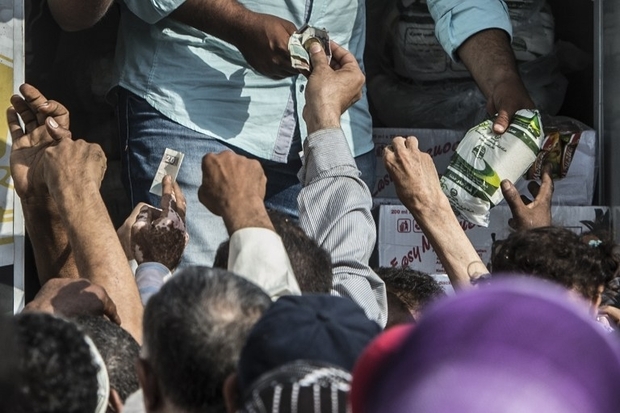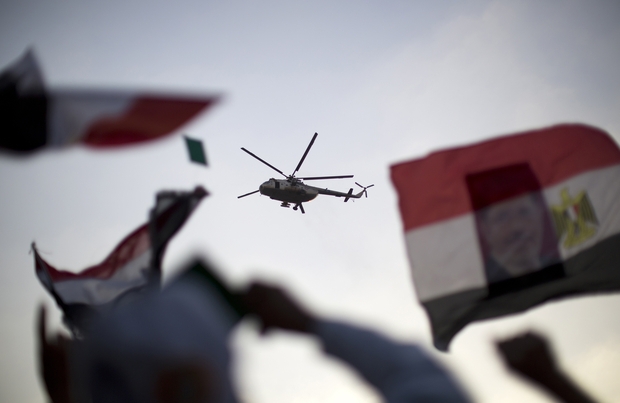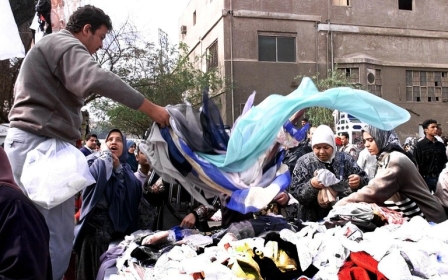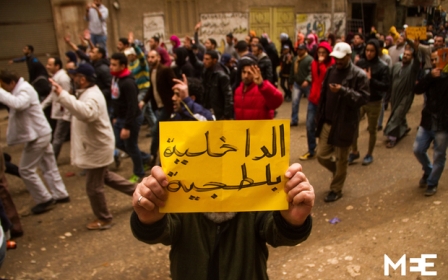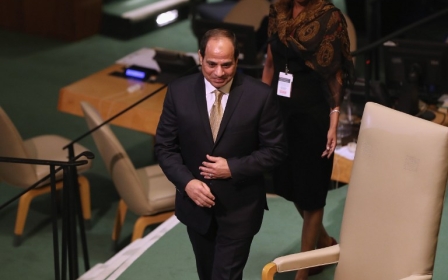Do Sisi and Egypt face another revolution?
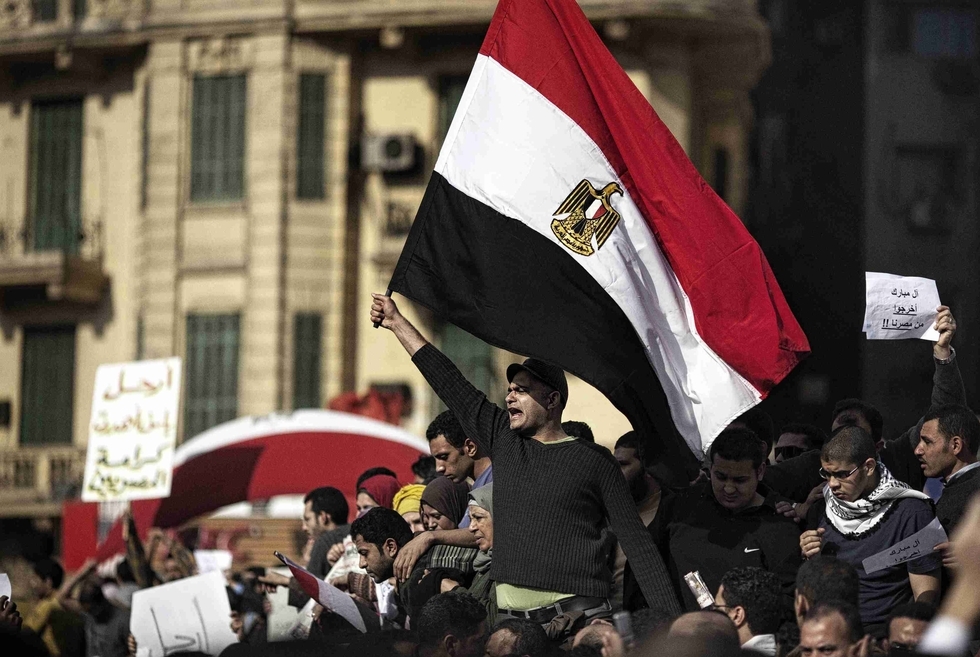
Government bullets extinguished more than 800 honourable lives during the 2011 revolution that began six years ago this week. They were the lucky ones.
But the 90 million Egyptians crushed by the oppressive governance of a counter-revolution, which has sunk Egypt to unprecedented lows, are the unfortunate ones.
Change, however, may be afoot and, in the ultimate irony, he who led the counter-revolution, President Abdel Fattah al-Sisi, could very well become the trigger for a future showdown.
Revolutionaries: More heart than political guile
As hundreds of Egyptian families buried their dead and thousands more tended to their injured, no one could be blamed for misunderstanding the true nature of the struggle at hand.
Most believed it was a struggle for dignity, freedom and bread, but the army was fighting for its mammoth financial empire.
“Follow the money”, the catchphrase of the 1976 drama All The President’s Men, which told the story of how reporters did just that to uncover the Watergate scandal, could be useful here.
By the end of 2011, according to most estimates, the army controlled between 25 and 40 percent of the Egyptian economy. Total secrecy is, and was, the government’s consistent mode.
Most believed the 2011 revolution was a struggle for dignity, freedom and bread, but the army was fighting for its mammoth financial empire
But it was not the nature of the army’s weaponry nor its positioning that was being kept under wraps. Instead, it was the amount of pasta, water and other army-sold services and goods, the real economic muscle of the army’s empire.
While "revolutionaries" fought and focused on the nature of the new political paradigm which the Muslim Brotherhood brought to power, the counter-revolution – embodied by Sisi and the gang – sought to protect its economic interests above all else. As it turned out, the revolutionaries had more heart than political guile.
Fast forward six years, and answer this: if a few old men control, as is likely now, an even larger percentage of the economy, and these men “lack the relevant experience, training, or qualifications for this task”, why then should it be a surprise that Egyptians are now faced with economic cancer?
Look to the political grenade of the Red Islands case in January, when the regime suffered a humiliating defeat as the administrative court declared that Tiran and Sanfir are Egyptian.
READ: Blood, bribery, and the two islands
Nothing short of a public slap to the face to the Sisi government, the verdict stopped mere centimetres from calling the attempted manoeuvre treasonous. Surrender of the two islands, the court ruled, is a “tremendous historical error” and nothing short of “a permanent threat to Egyptian national security… and a harm to Egyptian economic interest within its territorial waters”.
The lack of diplomacy in the verdict, in an almost entirely pro-government legal environment, was an unmistakable message to a regime that believes in might over right.
Where will trouble come next?
Only one day later, perhaps in an effort to distance the public gaze from the Red Sea islands disaster, the Sisi clan, with unmatched brilliance, decided to throw a national hero under the bus.
Mohamed Abu Terika, a retired football star, deemed by most to be the preeminent soccer player of the last 20 years, was officially declared a terrorist for his perceived support of the Muslim Brotherhood, despite an earlier court’s declaration that the freezing of his assets was null and void.
If a party is deaf to normal voice levels, then screaming is the logical alternative
Within two hours, #AbuTerikaIsNotATerrorist was trending on Twitter in Egypt. This sort of laughable miscalculation is no exception.
The current regime is strangely insistent on turning a usually calm Egyptian landscape into a frothing sea of anger. Rather than deliver security, Sisi is infatuated with a muscular posture that brings the nation closer to confrontation.
These were just the events of the past week - but if the current rulers are to pay a price for their numerous transgressions in the medium term, then it will be economic mismanagement that does them in.
READ: It's the Arab spring for dictators
Most Egyptians are in the grips of searing inflation, one that has nearly doubled during the last nine weeks to more than 24.3 percent, coupled with an explosive rise of 29.3 percent in the price of foodstuffs. These are a tremendous strain on a stumbling government.
With instability around every corner, where will trouble come from next for Sisi?
The crucial alliance with Saudi Arabia, the president's number one economic benefactor, is falling by the way side: Sisi must know Egyptians are fatigued by the instability of the past six years.
Naively, for a former intelligence man, he may calculate that the effect of a gun held to the head of the people has returned the fear which evaporated during the revolution. But that could prove to be a fatal miscalculation.
TV personality Ibrahim Issa, one of the regime blowhards whose TV show was recently suspended, captured it best when he said: “The regime’s heart is only wide enough for the regime’."
The death of the political process and free speech are no secret in this police state. If conversation is vilified and criticism deemed “unprofessional and subjective”, as Sisi said recently, then this can only lead to confrontation – and, on a larger scale, not just politically.
If a party is deaf to normal voice levels, then screaming is the logical alternative. Go hungry for long enough and the scales of fear will tip in favour of mushrooming anger.
Why civilian leaders are not the answer
One starting point for political change is the idea of "by the people, for the people". For the most part, the 25 January revolution was a peaceful expression of deep-seated anger - but any coming confrontation will not.
There are two reasons for this: the state’s lack of structural organisation and Sisi himself. Where chaos reigns, violence will, more likely than not, pervade. With Sisi on one side of the equation, the Rabaa massacre in August 2013 showed us that the shedding of Egyptian blood, under the guise of protecting Egyptian sovereignty and national security, is an invisible line.
Let us be crystal clear here: both economically and politically, Sisi’s rule mirrors the dynamics of an occupation by a foreign power
Should another confrontation like that which came in 2011 unfold, then many believe that the number of dead will be exponentially higher than those who died in the revolution.
Let us be crystal clear here: both economically and politically, Sisi’s rule mirrors the dynamics of an occupation by a foreign power. To change this, the price will likely be copious amount of blood.
Some may ask why civilian leaders like the Noble prize-winning Mohamed El Baradei and Hamdeen Sabahi, the former presidential candidate, can’t lead the way.
Simply put, both men’s credibility has been severely undercut. El Baradei departed after the 2013 coup, leaving Egypt, many felt, during its time of greatest need. Sabahi has lost support because he ran against Sisi in 2014, giving the election a false stamp of credibility. Without leadership, clear demands and a plan, violent chaos is more likely than not.
Door number two
Alternately, the second avenue for political metamorphosis - and the one which Egyptians who believe in a civilian paradigm at all costs won’t want to see - is a coup d’etat.
This option has been a ghost-in-waiting in the United Arab Emirates since shortly after Morsi's victory of 2012 in the form of Ahmed Shafik.
Shafik, for millions of Egyptians, was a viable option who, nearly, secured the presidency in 2012 himself. As the nation has strongly shifted to the right during Sisi's rule, so Shafik may be viewed as a centrist and comparatively unifying figure should Sisi continue to lose supporters from within and outside the country.
Six years after a failed attempt at freedom, Egyptians are now faced with a moment as dark as 25 January was bright
At the same time, one can never count out the minister of defence in a nation as militarily inclined as Egypt, as indeed we learned with Sisi, who himself rose to the presidency from that role not too many months ago.
Accordingly, it is plausible that the more reticent Sedki Sobhi could be the military establishment’s man-on-the-spot to appease an angry populous, protect its interests, and maintain a stranglehold on political power.
No one knows what such options could bring to the table - but for Egyptians seeking change, it would be yet another military boot to the neck of any democratic aspirations. In such a scenario, Egyptians need an army to protect them from the army.
READ: Why 2017 is the year Sisi will sink
Six years after a failed attempt at freedom, Egyptians are now faced with a moment as dark as 25 January was bright. Only days ago, Chris Jarvis, the International Monetary Fund’s (IMF) mission chief to Egypt, admitted that the “Egyptian pound has fallen more than expected. We were wrong in our policies and the poor will suffer greatly."
The IMF knows that the regime is at risk and that “the government could cave in”. The bottom line is that ordinary people are finding it harder to make ends meet. This is a formula, par excellence, for confrontation between the haves of government and the ruling business class, and the have-nots which number in the tens of millions.
To pretend that the Egyptian temple is showing signs of fracture is an understatement. On political, economic and social fronts, there are signs of the temple collapsing.
To do nothing is to disrespect the memory of the near-thousand who gave up their lives during Egypt’s most hopeful moment, six years ago.
- Amr Khalifa is a freelance journalist and analyst recently published in Ahram Online, Mada Masr, The New Arab, Muftah and Daily News Egypt. You can follow him on Twitter@cairo67unedited.
The views expressed in this article belong to the author and do not necessarily reflect the editorial policy of Middle East Eye.
Photo: Egyptian demonstrators wave their national flag in Tahrir Square in central Cairo on 30 January, 2011 (AFP)
This article is available in French on Middle East Eye French edition.
New MEE newsletter: Jerusalem Dispatch
Sign up to get the latest insights and analysis on Israel-Palestine, alongside Turkey Unpacked and other MEE newsletters
Middle East Eye delivers independent and unrivalled coverage and analysis of the Middle East, North Africa and beyond. To learn more about republishing this content and the associated fees, please fill out this form. More about MEE can be found here.



